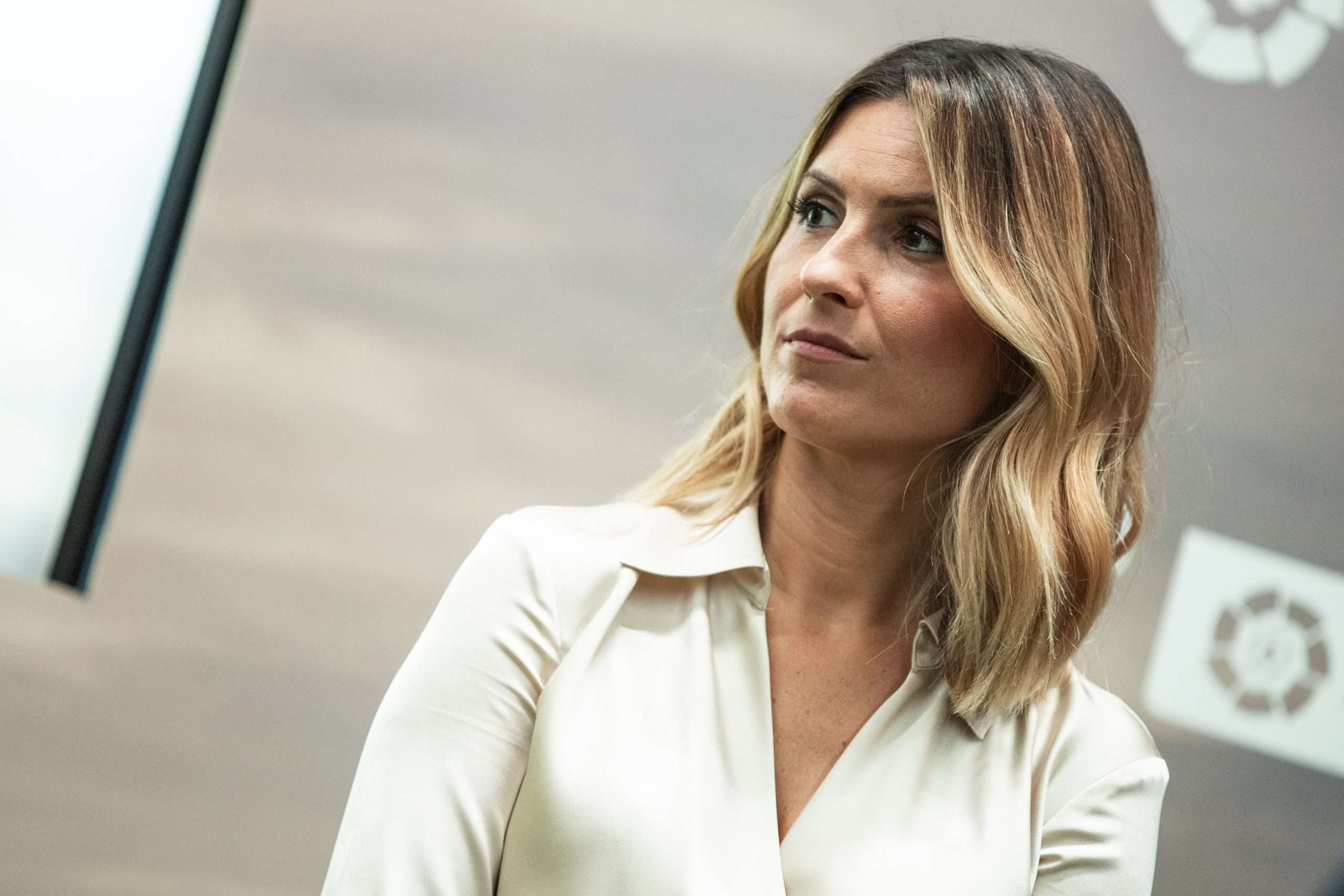Women play an important role in Spanish football. This is something we should remember not just on International Women’s Day but every single day.
And to coincide with this annual celebration, I have compiled a list of some of LaLiga’s most influential females.
From TV presenters to assistant referees to club presidents, although the following professionals have different roles within Spanish football, they all have one thing in common: they have broken barriers for future generations and are a source of inspiration for many.
And yet, despite their success, they still face a lot of machismo.
We cannot pretend otherwise.
Semra Hunter
British LaLiga fans will be familiar to Semra Hunter as she is one of the current anchors on La Liga TV.
🎬 #VIVALaLiga: 𝗧𝘂𝗲𝘀𝗱𝗮𝘆 𝗧𝗮𝗰𝘁𝗶𝗰𝘀.
— LaLigaTV (@LaLigaTV) March 2, 2021
Which was your game of the weekend?@SemraHunter breaks down Matchday 25 alongside @BumperGraham, Andrea Orlandi and @TerryGibson88.
📺 Watch LIVE now on #LaLigaTV!
Born in Los Angeles, she had previously worked with both Real Madrid TV and BeIN Sports.
Hunter, alongside the likes of Kelly Cates and Alex Scott, is thus one of the foremost presenters of football in this country. And as part of an exclusive interview with Get Spanish Football News last year, she spoke about the sexism she had experienced whilst doing her job.
“Fortunately, I have never experienced sexism from within the organisations that I have worked for. However, that is not to say that it does not exist,” she said.
“Most of the sexism I have experienced in this line of work has been related to fans whether that was physically as a reporter or online comments that have been very nasty at times,” she added.
#HappyInternationalWomensDay to all women out there.
— Semra Hunter (@SemraHunter) March 8, 2021
Know that you are strong, beautiful inside and out, talented and capable of anything you set your mind to. Don’t let anyone or anything hold you back. Know that you have support to be the best you.
Keep rocking. 👩🎤💜 #IWD2021 pic.twitter.com/DZ2wncIBws
If Semra Hunter is one of the main presenters of Spanish football for British television, then Danae Boronat is one of her counterparts in Spain.
Danae Boronat
Born in Catalonia, Boronat in 2019 became the first female to commentate on a top-flight LaLiga match on Spanish television.
In the same year, Boronat and Sara Giménez jointly became the first women to commentate on Spain during a World Cup when they worked on the 2019 Women’s World Cup for Gol TV.
Boronat currently works as a presenter on Movistar+, which is one of the major Spanish TV networks.
Seguimos con #LaCasaDelFútbol en Movistar LaLiga.
— Fútbol en Movistar Plus+ (@MovistarFutbol) February 20, 2021
Con @danaeboronat, @PichiAlonso9, Martín Vázquez y Santiago Segurola. pic.twitter.com/3z96QRTYq4
She has also recently written a book which will be released on the 24 March entitled “Don’t call them girls, call them footballers.”
Os presento a mi hijo, mi libro. A la venta el próximo 24 de marzo. Ya lo puedes reservar en: https://t.co/tJXfKat5A7@Planetadelibros @LibrosCupula pic.twitter.com/rASu840oLI
— Danae Boronat (@danaeboronat) February 24, 2021
Sara Giménez
As well as commentating on the 2019 World Cup with Boronat, Giménez, in the same year, also became the first women to commentate on a live match on the radio.
Giménez currently collaborates with and presents programmes on national radio station Cadena Ser as well as Gol TV.
She also has a YouTube channel in which she interviews different women in sport.
Susana Guasch and Sara Carbonero
If the Spanish press is notorious for its relentless coverage of football then radio is no exception.
Cadena Ser and RNE (two national broadcasters) have regular live games, programmes, debates and interviews with players/managers.
And Cadena COPE is another.
The journalist Susana Guasch forms part of this radio’s El Partidazo de Cadena Cope, an evening show, as well her presenting duties in the Champions League for Movistar+.
Before this, she had also worked for eight years with La Sexta.
Sara Carbonero meanwhile has spent much of her career in journalism working for rival TV station Telecinco.
And if I have put these two journalists together, it is because they have had to deal with similar issues of sexism throughout their careers, especially as they have gained prominence over the last decade. In 2012, in Spanish newspaper ABC, Carbonero and Guasch were used as examples of how sports journalism was no longer the domain of men.
Yet, in 2018, a feature entitled “the rampant machismo in sports journalism” was published in Spanish football magazine Libero in which Carbonero and Guasch, amongst other women, were interviewed.
“They (male journalists) aren’t asked to be sexy or handsome. It is a handicap that still holds us back. And if a woman makes a mistake then the criticism will be a lot fiercer,” said Guasch.
“There are still people who struggle to accept that a woman can inform them about sports. They think information is more credible coming from a man,” said Carbonero.
In spite – and because of – their success, Carbonero and Guasch are criticised in ways men simply are not.
Amaia Gorostiza
It is not just in the world of journalism where women play a key role in Spanish football.
If we are talking about breaking barriers, then Amaia Gorostiza must be in the conversation.
She is the current president of Eibar whilst Patricia Rodriguez was in 2018 the club’s chief executive. In an interview with the BBC, Gorostiza spoke about her role at the Basque club and being a female president of a LaLiga side.
“For us it [being female] is something natural and we do not give it more importance,” she said.
“It is being given more importance from the outside, I recognised the first time some presidents looked at me a little bit strange but if you act like it is natural then it will be.
“I have never been treated differently on my visits to other stadiums and I have always worked in a male-dominated environment,” she added.
LayHoon Chan was also president of Valencia between 2014 and 2017, whilst María Victoria Pavón is the current president of second division side Leganés. Three years ago on International Women’s Day, Women’s Soccer United wrote about how “women were taking more important roles in LaLiga.”
As well as Gorostiza and Pavón, they pointed to Getafe’s press officer Luz Monzon, Alavés’ nutritionist Ainhoa Prieto and Real Betis’ fitness coach Raquel Urbano as ways in which women were enjoying important roles in teams throughout the Spanish top flight.
Guadalupe Porras Ayuso
In a previous article for Get Spanish Football News, I wrote about Guadalupe Porras Ayuso, who recently became the first woman from Spain to be a part of a European men’s match.
The assistant referee is regularly seen in LaLiga and she hopes that she can be a source of inspiration for many women.
“I am delighted if being an assistant referee will open the door to many girls who are starting out. It’s great that the presence of women in any working environment is being normalised,” she was quoted as saying in Mundo Deportivo.
Fans
Football would be nothing without fans, as COVID-19 has shown. And according to an article written in 2018 by The Luxonomist, 49% of women in Spain are, in some way or another, football fans, as shown in a survey by Kantar Media.
This percentage is practically double the tally of England (25%).
In another survey, it was claimed that women make up 38% of the world’s football fans and 33% of those who go to stadiums to watch a game.
And whilst The Luxonomist suggests that female participation in Spanish football has increased, they are still not fully represented.
It is therefore imperative that women like Semra Hunter, Danae Boronat, Sara Giménez, Sara Carbonero, Susana Guasch, Amaia Gorostiza and Guadalupe Porras Ayuso, among many others, are able to be a source of inspiration for many.
We should always remember this.
Not just on International Women’s Day but every day.











